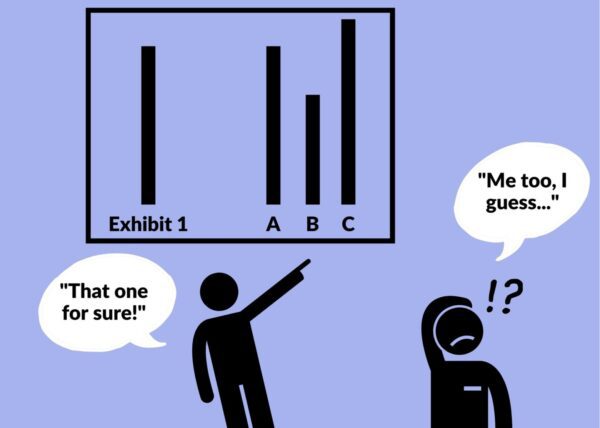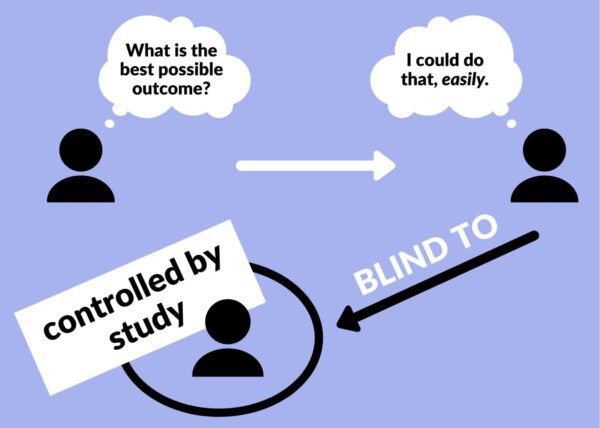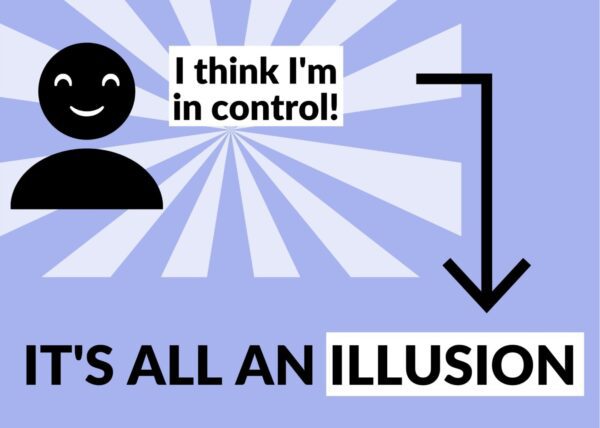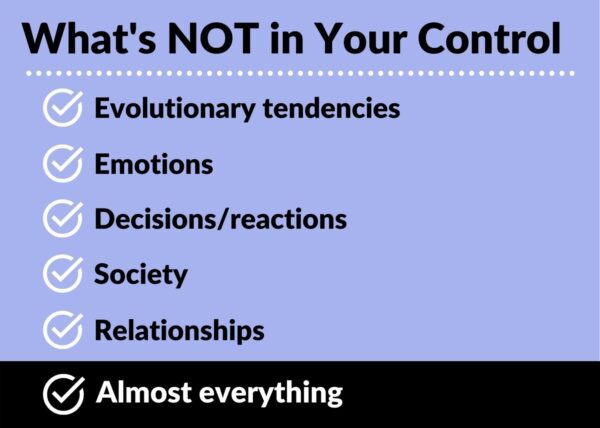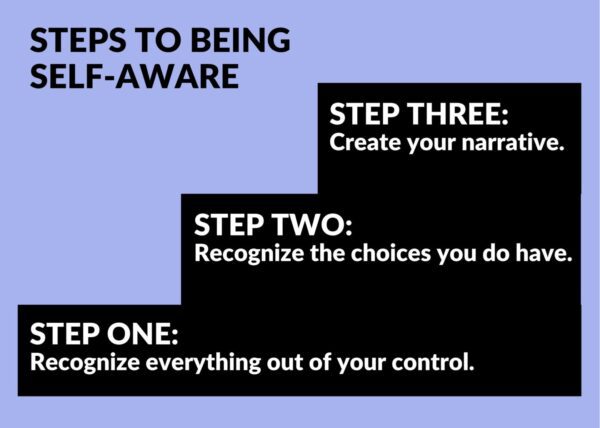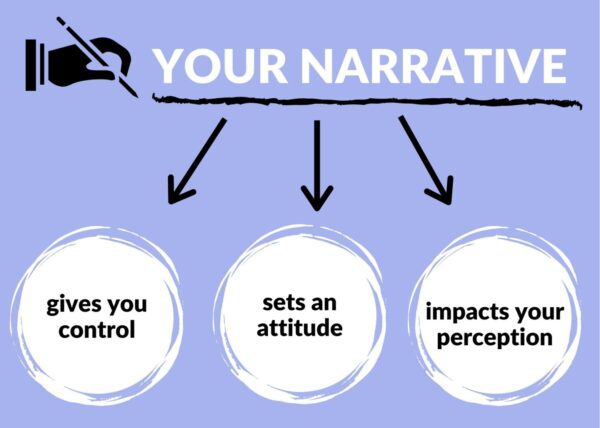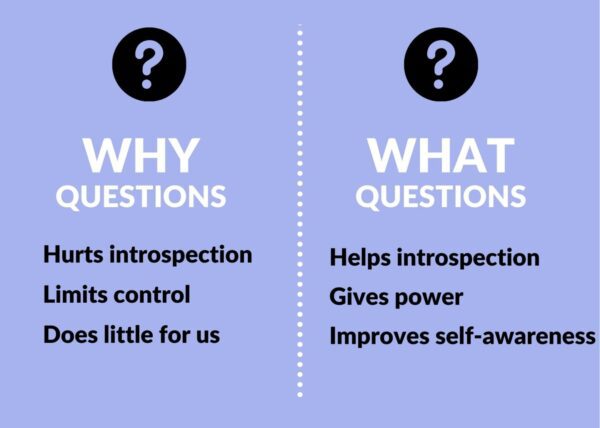In this post, you’ll learn why self-awareness is important in recognizing what you control – and what you can’t.
In 1951, a social psychologist wanted to test how likely people conform to the majority, even if the majority is incorrect. Dr. Asch selected 50 male college students and put them into various “vision tests” with other people. Next, they had to answer a series of questions about the length of lines.
What the students didn’t know was that everyone else in the test rooms were actors.
After the tester posted a question, the actors would then all confidently declare the incorrect answer. Meanwhile, Dr. Asch observed the participants’ responses.
Nearly one-third of the participants went along with the majority answer, even though it was incorrect. And less than one-quarter of them stayed true to their own answer and never conformed.
Folks, we’re not talking about slightly different lines. We’re talking lines that are noticeably distinct from each other. The participants were so enamored with conforming to the group, they chose to believe strangers’ answers over their own.
Not surprisingly, this experiment has been cited hundreds of times. Scientists use it as proof that humans are extremely susceptible to peer pressure and group conformity. Yet, it’s rarely mentioned when it comes to why self-awareness is important.
Until now, of course.
You might already be predicting the connections I’ll make between this study and why self-awareness is important. The participants weren’t self-aware about their urge to conform. Had the students been more self-aware, they might have had more confidence in their answers.
All great guesses. But you, like 30% of the participants and all of the actors, would be incorrect. (Hey, it’s my experiment – I can bias it how I want to!)
What does the Asch Conformity Experiment have to do with the importance of self-awareness?
Simple. The participants lacked the self-awareness to know that they lacked self-awareness.
Welcome to the human condition.
.
What is the purpose of self-awareness?
When we learn about this experiment (or any experiment, for that matter), we have a natural tendency to place ourselves in the situation. What would I have done? we ask ourselves eagerly.
Two things happen during this self-imposing.
First, our brains search for the best possible outcome. After all, we’re not going for second-rate. In this case, we associate “best” with the 25% of people who didn’t conform to the incorrect answer. I’m right, and I know I’m right.
Second, we overestimate our abilities to achieve this “best.” Sure, we’d all like to think we’re in the “I’m not going to say a wrong answer just because everyone else does” camp. Even as I peered at the lines, I wondered how on earth anyone questioned the correct answer. (And I’ve got bad eyes.)
And, who knows; perhaps some of you are reading this, thinking, Yuppp. I would’ve conformed in a heartbeat. And you, my friends, are more self-aware than the majority of us.
But you’re still not that self-aware. Because, in the rapidity in which we moved through these two steps, we failed to see the third step. Numero tres. The defining yet undetectable #3.
None of the participants realized they were in a study. The best-case decision in the study is to identify the correct line. But the most-aware decision can only come from knowing that your environment, actions, and thinking are being manipulated.
Yes, the purpose of self-awareness is understanding that you’re influenced by social norms. It’s identifying when your brain plays tricks on you, and your emotions get in the way. And it’s certainly recognizing your decisions and behaviors.
But self-awareness, at its core, is realizing what outside factors you’re being controlled by. It’s being able to be an observer of your own self.
Only then can you learn what you can control yourself.
.
The Illusion of Control: A Self-Awareness Deception
In 1990, the government passed the Americans With Disabilities Act. One of the protections ensured that people in wheelchairs would have enough time to enter an elevator. The “close door” function became outlawed. But, because people like to feel in control, most elevators kept the “close door” button – even though it does absolutely nothing.
That’s right. For the past two decades, every time you pushed the “close door” button, more than likely, it did nothing.
Why keep the button? For the same reason that crosswalks still have “walk” buttons even though traffic signals are timed, or that offices have “dummy thermostats” that don’t change the temperature. Humans like to feel like they have control. Perceived control is actually beneficial for our mental health.
When we feel like we have control over our lives, we increase our self-efficacy. It’s easier to find meaning in our decisions. We can ward off the existential crisis of empty choices/feeling worthless/doing nothing/having no say/lacking certainty/searching for meaning/how many slashes can I put here.
We also like there to be reasons behind everything. X caused Y. Because of Q, Z became inevitable. We followed A, B, and C, and it led to D. (Did anyone else feel like they were back in an elementary classroom with this alphabet?)
Causation, however, is merely another representation of our desire for control. We want stories to make sense because we want to predict outcomes.
I’ll come back to this idea of stories in a few moments. But first, I want to make sure the self-awareness piece is clarified.
Only when we can acknowledge what’s out of our control can we experience the benefits of self-awareness. And only when we realize what choices we do have can we understand why self-awareness is important.
.
The Importance of Self-Awareness of Your Choices: What’s NOT in Your Control
First things first. Almost everything is out of your control. Why?
Well, a lot of reasons, so we might as well dive in. Here are six aspects of our life that are out of our control and make it difficult to be self-aware.
.
-
Our evolutionary tendencies
Let’s just put this one out here right away. The Asch Conformity Study participants didn’t actively choose to be incorrect; their human need for social belonging chose for them. Similarly, our social comparison, stress response, and survival-motivated fear dictate much of what we do. We are an animal with millions of years of evolutionary instincts and brain biases. As a result, most of us lack self-awareness.
-
Our emotions
In this same vein, our emotions take up a sturdy trophy on the “things we can’t control” mantelpiece. Sure, we can regulate our emotions and talk back to them. But we can’t control them any more than we can control the weather. What’s more, our emotional brain sits at the base of our spine. This means that our emotions drive our behavior more than our thoughts do.
-
Our decision-making and reaction to the environment
We choose what to do and how to react, riiiiight? Not quite. Sure, we can make choices (although most humans now reach decision fatigue after a few hours). But when it comes to our environment, we’re much more reactive than we are in control. Our brains have been storing up emotional memories for years. In doing so, our environments have trained our brains to react in a certain way – often without our self-awareness. Self-control is a bit of an illusion when it comes to moving through our daily routines.
-
Our society
This one should be obvious, but many of us fail to recognize just how far society’s influence goes. Cultural messages and social norms hit us from a young age. We are so wrapped into the folds of society, we can’t even distinguish where our ways of thinking came from. As to why self-awareness is important? It lets us begin to see how our culture affects us.
-
Our relationships
There are certainly avenues in our life where we can choose what people we will interact with. However, even in the healthiest of relationships, we have no control over the other person. That’s why it’s so hard to be vulnerable – we’re terrified of uncertainty because it could lead to rejection. But we cannot control our relationships or another person’s behaviors, no matter how hard we may try. This is why self-awareness is important in relationships. It helps us to navigate a union between two separate individuals.
-
The majority of events in our lives
I would like to think that my decisions and efforts led to my current situation. In many aspects, they did. But in a whole world of possibilities, they didn’t. I can’t control the actions of others or the events of history. Additionally, I can’t control my race, gender, upbringing, or the multitude of identifiers that will affect how people see me and how I navigate my place in the world.
Despite the negativity that this list might inspire, it’s necessary to explain why self-awareness is important. (And why self-awareness has so many benefits.)
You see, the problem is that most of us don’t realize that these things are out of control. We think we’re in control – a deception that further limits our agency. Just like the participants in the Asch Conformity Experiment, we’re in a study without realizing we’re in a study.
Why is self-awareness important? You can recognize what power you do have, and then make decisions accordingly.
.
The Steps to Being Self-Aware: the Purpose of Self-Awareness
Don’t worry; your life isn’t a directionless, meaningless ball of out-of-control goop floating in the ocean. (I’m not sure what “goop” is and why it floats, but I liked the sound of that sentence.) No, your life is an out-of-control ball of goop that’s brimming with potential meaning.
To bestow your goop with meaning, however, you must take the following steps.
Step One: Recognize everything out of your control.
To identify where we do have control in our lives, we first must recognize where we don’t have control. The list above might seem depressing, but it doesn’t have to be. It’s challenging for us to relinquish our sense of control (because of our out-of-control evolutionary tendencies, for the record). But when we do, we can overcome the illusions of control that deceive us. Sure, this might not be fun if the illusion of control makes us feel good. (“I earned this award, damnit!”) But in the long run, it’ll allow us to double down on the real choices we have.
.
Step Two: Recognize the choices you do have.
Right before you feel like giving up on the meaningless of life, take a step back. You do have choices in your life. Where are they? What can you do that’s influenced by your desires alone? This step requires a great deal of self-awareness. Figuring out who we are and what we want are not quick processes. Instead, we must be willing to ask ourselves hard questions, lean into discomfort, and retrain our brains after years of social conditioning. This step helps us realize the most life-changing choice we do have, which is:
.
Step Three: Control your narrative.
Finally, the foundational choice for all other choices: the story you tell yourself about your life. Remember, humans love a good story. In fact, we depend on stories and connections to make sense of our world. (Think back to my alphabet examples.) While we can’t control many of the story’s events, we can control the narrative voice; the tone, pace, and inflection that make it unique. You have agency over how you view things.
.
What is your narrative?
What narrative do you create for your life? Are you optimistic or pessimistic? Grateful or indignant? Moving forward or stuck in place?
This step isn’t easy, nor will pesky things like emotions and social norms leave you alone in the process. But you are in complete control of your narrative.
Furthermore, when you take control of your narrative, you become self-aware of the real control – not the illusion of control – that you have in your life.
Let’s talk about my good friends Shirley and Mike to illustrate this concept and why self-awareness is so important for creating your narrative.
.
Using Self-Awareness to Create a Narrative for Yourself
Shirley and Mike both had appointments scheduled with their doctor on Friday. The visits have been planned for months, and both individuals cleared their work calendars for the afternoon. Then, early Friday morning, they get calls from the receptionist saying that the doctor’s sick and they’ll need to reschedule.
When Mike gets the call, he slams the phone down on the receiver. Not only did he have to move two meetings that afternoon, but now he’ll have to do it all over again for a second time. Why did the doctor have to get sick on the day I had an appointment scheduled? he thinks angrily.
Shirley, meanwhile, thanks the receptionist for the news. She leans back in her chair and ponders her now-clear afternoon. Three open hours were tough to come by in her world. She considers the possibilities; she could be productive in the office or leave early and enjoy some solitude at home. What a surprise gift, she thinks.
Both individuals had no control over their doctor’s illness. But, while Mike lamented this fact, Shirley searched for a silver lining. In doing so, she shifted from a position of powerlessness to a position of agency.
.
Self-Awareness Allows You to Recognize the Truth of the Situation
Shirley, clearly, will have a better day than Mike. It’s no surprise how much our attitude affects our outlook. However, I want to look deeper into this example. Because Shirley didn’t just choose to be happier, she chose to adopt more control in her life.
When we shift our focus from, “Why did this event happen to me?” to “What can I gain from this event?” we regain control in our life.
It takes self-awareness to make this shift. So caught up in his uncontrolled reaction, Mike didn’t have the awareness to make a different choice. Conversely, Shirley had the self-awareness to know what she could control and what she couldn’t.
Now, I’m not advocating that everyone should adopt a rose-colored approach to everything. There isn’t always a silver lining, nor can we immediately jump to a “How can I benefit from this?” mindset every time.
But the more self-aware you are of your narrative, the more control you’ll have over it. And you can begin to make this shift with the type of questions you ask.
.
Stop with Why and Move to What
The question, “Why?” is often promoted as a positive. Asking why helps us get to a deeper meaning; our “why” drives our motivation and actions; five “whys” get you where you need to look. Heck, the very title of this post is, “Why is Self-Awareness Important?”
In all of this encouragement, however, we often overlook a fatal trap. Asking “why” can hurt our introspection and surrender control in our lives.
Questioning why something happens generally does little for us. Whether there’s an answer or not (and often, there isn’t), it doesn’t give us anything in the present moment. It also doesn’t add anything to our future.
Why questions often paint us as more powerless in our narratives.
A good practice is to ask more “what” questions. Questions like, What can this give me? What did I learn? These types of questions help improve our self-awareness and, as a result, open up more opportunities for us to grow.
What questions reclaim agency over our lives.
.
Why is Self-Awareness Important: Recognizing What You Can Control
Our lives are filled with things in our control and out of our control (and sometimes, in our illusion of control). Therefore, our best chance for success and happiness isn’t trying to change these elements. It’s recognizing what we can control and then doing so accordingly.
Self-awareness is important because it allows us to identify the choices we have in our lives. We can recognize what we can control and what we can’t. Then, we can make changes based on what we can control. Most notably, we can control the narrative that we tell ourselves about our own life, who we are, and how we fit into the world.
The more self-aware you are, the more you can become the active author – rather than the passive reader – of your own life.


